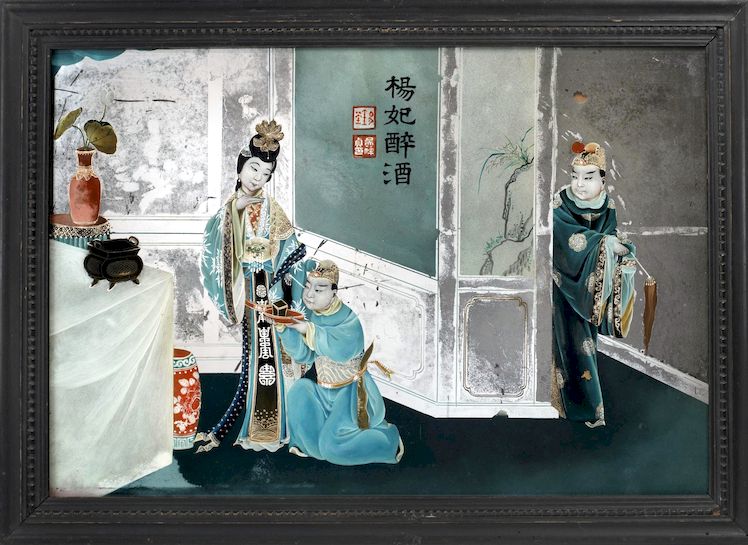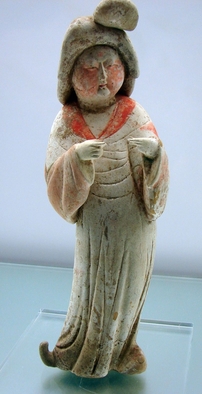
This painting on a rafter in the Qīng Dynasty Summer Palace shows Concubine Yáng bathing in the Huáqīng Palace 华清宫, built for her at the foot of mount Lí 骊山.
Emperor Ruìzōng 睿宗 = a deceased emperor (12a-8) of the Táng 唐 dynasty
YÁNG Xuányán 杨玄琰 = His President of the Board of War, ennobled as a duke
YÁNG Yùhuán 杨玉环 = Yáng’s daughter, famed for her beauty (and also for her plumpness)
YÁNG Guózhōng 杨国忠 = her second cousin, a drunk, gambler, and general ne’er-do-well
Emperor Mínghuáng 明皇 = talented successor to Emperor Ruìzōng 睿宗
Prince Shòu 寿 = his 18th son
ĀN Lùshān 安禄山 = a dashing and ambitious sheep thief
YÁNG Xuányán 杨玄琰 was a loyal official of the Táng 唐 dynasty, who had an exceedingly beautiful daughter named YÁNG Yùhuán 杨玉环, who was exceedingly beautiful, and quite plump. (Plumpness was all the rage for court ladies in the in the Táng dynasty, and Courtier Yáng found it was easy to arrange a marriage between the beautiful Yáng Yùhuán and Prince Shòu 寿, the 18th son of the great Táng monarch, Emperor Mínghuáng 明皇 (reign 12a-9).
Like any good wife, she was affectionate to her husband and extremely kind to her husband’s father, the emperor. When, three years later, the empress died, Yáng Yùhuán made no objection when the mourning emperor moved her into his harem so that she could comfort him in his great official grief. (Prince Shòu, being by definition very filial and in any case only an 18th son, was in no position to object.)
Concubine Yáng (as Yáng Yùhuán was now called) was very comforting to the emperor. Verrry comforting. Indeed, she was so very comforting that his majesty called her his tàizhēn 太真 , which was a Daoist term for pure gold, and people spoke of her as his majesty’s pure gold concubine (tàizhēn fēi 太真妃), which pleased her very much (He also called her his fat slave (féibì 肥婢), which probably pleased her somewhat less.)

There was quiet grumbling among the courtiers, of course. They said he had been an excellent emperor before she had arrived but now he was neglecting affairs of state in order to play with her. But courtiers say that sort of thing a lot, and it rarely means anything. Most of them were merely envious because they didn’t have plump and pretty wives like the Pure Gold Concubine.
Concubine Yáng’s relatives lived in ever greater luxury, her wastrel cousin, the prime minister, most of all. None of them paid much attention to what happened outside the palace walls, where the little people lived.
As time passed, Concubine Yáng became more and more influential, and the emperor did little without consulting her. She made sure that her three sisters were also taken into the harem, and she had her second cousin, YÁNG Guózhōng 杨国忠, a famously dissolute wastrel, raised to prime minister and given the title of duke. Fond of gambling, but bad at it, Yáng Guózhōng could go through money from the imperial treasury with an efficiency that was a source of wonder to all.
Once again there was grumbling among the courtiers, of course, but always in secret, for as prime minister Yáng Guózhōng, although incompetent, was powerful and inclined to be vindictive. And therefore in public all the court fawned over him.
(Well, actually, a certain ZHĀNG Tuàn 张彖 said of him, “Men lean on Yáng Guózhōng as though he were Mount Tài 太, but I regard him as a mere iceberg. It's hard to rely on icebergs. They melt.” But nobody paid any attention to him, and he suddenly received a new appointment way out in the sticks, far from the capital, where difficult officials were sent in hopes they would soon die of something dreadful. History knows no more of him, although the expression “it's hard to rely on icebergs” —bīngshān nán kào 冰山难靠— remains a common saying to this day.)
Time passed and Concubine Yáng grew ever more powerful. In 745, seven years after she had entered the imperial harem, she finally received the title she sought: Guìfēi 贵妃 (which meant chief concubine), although everybody had long known that she was in charge. The emperor spent his time playing with Yáng Guìfēi’s anatomy and chuckling at her cleverness and drinking more wine than a well-bred emperor really ought.

The story is told that once Concubine Yáng was to dine with his majesty in the Hundred Flowers Pavilion (Bǎihuā Tíng 百花亭), but he didn’t arrive and didn’t arrive. Finally she learned that he had already moved to the West Palace without advising her.
She felt abandoned. In a mix of ever increasing disappointment, anger, and shame, she ordered two servants to bring her more and more wine until, perhaps intentionally, she became quite indecently drunk. (This incident might have been forgotten had it not become an opera called “The Hundred Flowers Pavilion” or more often “The Tipsy Chief Concubine” —“Guìfēi Zuìjiǔ” 贵妃醉酒.)
Meanwhile, far to the north, the wife of a Turkic tribesman surnamed KĀNG 康 gave birth to a pretty little son. The beasts in the fields all cried out when it happened, and the whole house radiated a ghostly light, so naturally the neighbors decided that the mother was a witch, and the authorities decided that the child ought to be killed. What else would neighbors or authorities decide?! But his mother succeeded in hiding him, and in the end memories faded and tempers cooled.
A few years later the boy’s father died, and his mother married into a family named Ān 安. Thus, the lad became known as ĀN Lùshān 安禄山. He was a strong , handsome, clever child, and a master of several frontier dialects. He was famed in his youth as a brilliantly successful sheep thief. In his work as a thief he routinely outsmarted and outmaneuvered various pastoral groups, which, to his surprise, was interpreted by the Chinese authorities as suppressing rebellions.

One thing led to another, and soon young Ān Lùshān, lover of sheep and suppressor of rebels, came to the attention of the emperor and, of course, the imperial concubine, who found his fine physique, his handsome face, and his rustic ways completely charming. (She called him her adopted son, and she had him bow to her before bowing to the emperor on the grounds that doing so was a charmingly exotic Turkic custom.)
Charged with the general suppression of Turkic rebellions (of which there were many) Ān was so successful that the Imperial Concubine had him made a duke, equal in rank to her useless second cousin, and made him part of the emperor’s inner circle. (There was more grumbling among the courtiers, of course, but they always grumbled. At least Ān was competent, unlike Yáng Guózhōng.)
One time the Imperial Concubine offended the emperor and was banished from his sight, but he missed her so much and she affected to be so distressed, that he was easily persuaded to restore her, to the relief of her sisters and cousin.
Prime Minister Yáng Guózhōng disliked the charming and competent Ān, but felt he needed him, so although he spread the seeds of doubt to the emperor, but he took no additional action. One time Ān Lùshān lost a battle, which normally got a person permanently disgraced or, often enough, executed. But Yáng Guózhōng persuaded the emperor to forgive him and Ān continued to command troops, although he was stationed far away from the capital.
Having discovered how clever he was at military affairs, and being located in a place where the emperor was obviously paying very little attention. Ān decided to become a rebel himself. Stealing an empire couldn’t be that much harder than stealing sheep, he reasoned. He declared himself emperor of a new dynasty, complete with concubines. His military success was brilliant. He destroyed the city of Kāifēng 开封 (killing its inhabitants) and captured Luóyáng 洛阳. Then he moved swiftly with a growing rebel army towards the capital at Cháng’ān 长安.
In 756, as Ān Lùshān’s forces approached Cháng’ān so that he could found his new dynasty, Emperor Mínghuáng, now 70, and Yáng Guìfēi, in her 40s, were forced to flee together with her sisters and cousin, to the southwest, hoping to reach safety in Sìchuān 四川, a region none of them had thought anything about for many years.
As they approached a place called Mǎwéipō 马嵬坡, the troops rebelled. They killed Yáng Guózhōng and the palace ladies. Then they insisted that they would support the old emperor no longer unless he had his beloved Yáng Guìfēi killed, ending the disastrous Yáng domination of the state once and for all.
In despair, the emperor finally ordered a eunuch to see that she hanged herself, and then abdicated in favor of his son. Some say she hanged herself from a pear tree with her silk sash. Some mutter that the eunuch probably strangled her first and then hung her up. Some historians blame Yáng Guózhōng for the whole mess, and and some blame Yáng Guìfēi.
Poets and dramatists tell the tale to this day as one of the greatest love tragedies in history. The poet Bái Jūyì 白居易 permanently enshrined this romantic view in a long poem called “Song of Unending Sorrow” (Chánghèn Gē 長恨歌).
The rebellion didn’t work out well. Ān Lùshān did capture Cháng’ān, to its distress, but local leaders across north China either declared themselves loyal to the badly shaken Táng dynasty, or tried to become emperors themselves. Ān’s eldest son assassinated him when one of the concubines produced a more engaging rival for his father’s affections. (The lad was himself killed a couple years later.)
After a vicious civil war, a much weakened Táng dynasty resumed its sway in China.